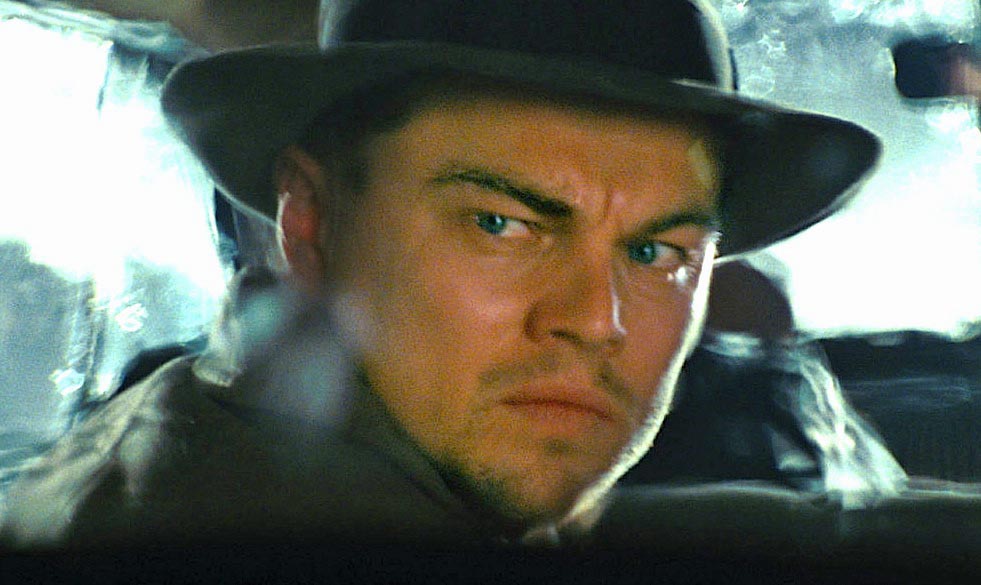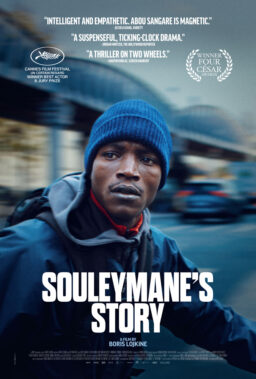“Shutter Island,” which opens Friday, is the fourth film Leonardo DiCaprio and Martin Scorsese have made together, and the most unexpected. It’s not a biopic (“The Aviator“) or a modern gangster movie (“The Departed“) or a historical gangster movie (“Gangs of New York“). It securely occupies that most American of genres, the film noir — the dark film, the film that takes place in the shadows of human nature.
DiCaprio plays Teddy Daniels, a United States marshal. The time is 1954, toward the end of the original film noir era. His assignment: Help find a woman killer who has disappeared from a prison for the criminally insane on a remote and craggy island. It’s a Locked Room mystery, because there seems to be no way to leave the island alive.
Daniels and his partner Chuck (Mark Ruffalo) arrive seen with those two invaluable props of the film noir hero, fedora hats and cigarettes. They talk like film noir heroes — tough and aggressive. On Shutter Island they encounter a man, however, who seems to come more from the horror genre than film noir. This is Dr. Cawley (Ben Kingsley), the precise and remote man in charge. Reading the original novel by Dennis Lehane, he reminded Scorsese of the hero, if that is the word, of the silent film “The Cabinet of Dr. Caligari.”
I sent DiCaprio some questions. His replies, as I might have expected, were thoughtful and perceptive. He is and always has been (ever since “This Boy's Life” and “What's Eating Gilbert Grape” in 1963) an intelligent actor, never content to be only a star, although that certainly happened after “Titanic” in 1997. “This Boy’s Life” was his first major feature, and it’s interesting that he co-starred with Scorsese’s muse, Robert De Niro.
Q. I hear that Marty showed you some classic film noir before you began shooting. Which actors did you respond to? Was there a particular film that struck you?
A. Certainly Dana Andrews and Jimmy Stewart. And you know on my own, Travis Bickle in “Taxi Driver.” The films that we saw ranged from “Steel Helmet” to “Laura,” to “Out of the Past,” to “Vertigo,” to a documentary about a mental asylum called “Titicut Follies.” All of which are greats points of reference when you’re on the set working with Mr. Scorsese.
Because like a great painter you’re a part of the pre-production process while you’re working with the actors and the cinematographer and the set director, who decorated to really give us a deep understanding of the movie he was trying to create through cinema’s past. So with Scorsese it’s always a unique, enjoyable experience that gets you excited about making movies.
Q. The viewer gradually realizes you play a very complex and layered character in “Shutter Island.” How did you deal with that in performance? By prefiguring it, or ignoring it?
A. We very much were conscious of the different ways to portray Teddy. Often times we would take him to different emotional extremes. This was something that not only I was aware of but all other actors were aware of on set.
There’s a lot of ambiguity in this film. And there were a lot of different directions to go, character-wise. So we left all those options open for Marty and Thelma Schoonmaker in the editing room to decide at what point they would want to push the character emotionally.
But I think that the screenplay was almost deceiving at first. There are these very complex, descriptions of Teddy’s past and his memory and things that were, in fact, you know a dream. And the lines become blurred. But in every situation we deal with highly emotional, highly intense pursuits of the truth. And to do that we needed to, you know, keep pushing the boundaries of Teddy’s emotional reactions.
Q. Thrillers based on atmosphere, character and plot grab me more than those based on action. You?
A. Well, I do feel the same way. And as much as technology’s going to take a place in cinema’s future, the most important thing to me is story. If I’m not emotionally engaged with the character, if I have to go to set as an actor and know that the lines that I say mean exactly what they mean, that’s a boring day at work for me.
I love the challenge of being able to take on characters that aren’t always what they seem. Be part of story lines that on second and third viewing of the film can take on a different meaning for me as an audience member. I think “Shutter Island” is very much indicative of those types of films.
Although there’s a lot of ambiguity in this film, on second and third time viewing, things become more specific and they could be a completely unique experience watching them on the next go-around.
Q. You and De Niro are Marty’s signature actors, yet your styles are quite distinct. Do you think that’s influenced some of Marty’s story choices?
A. Well, I still don’t know what my style is. But look. I’m as big of a fan as anyone of their collaborations together. Artistically, they’ve forged maybe the greatest director-actor relationship in cinematic history and made some of the biggest masterpieces. So I have to look at my relationship with Marty in a very unique way. Never do I try to compare that relationship, it’s too a high a mantle to try to surpass.
So what I basically do is commit myself fully to whatever the story lends itself to, and give Marty everything he needs, and try to push myself to the extremes that I can go to. Ultimately, I know he has the best intentions and has such unique, distinct tastes that I trust that any journey he wants to go on will be one that’s the right one.
Q. I thought “Revolutionary Road” (2008) was spectacularly good, as was your performance. There again you reach back to the 1950s, yet the characters could hardly be more different. I think also of your Howard Hughes in “The Aviator,” going back further. What interests you about characters of that vintage?
A. There are different aspects. Certainly you know what was prevalent in “Aviator,” “Revolutionary Road” and certainly “Shutter Island” was war — and the forming of what our country ultimately became after World War II. How all these characters reacted in different ways to that war. It was a theme that was constant throughout this movie. It’s just fascinating to see through these different character eyes, and historically, the formation of what our country ultimately is today in response to war.
Obviously, Frank Wheeler of “Revolutionary Road” and Teddy from his film go to much different extremes and are have completely different reactions to the post=traumatic stress, you might say, of warfare. It’s a definitive moment in American history and it results in a lot of great story lines and interesting characters.
Q. And soon it’s said you and Scorsese will make “Sinatra,” who came up in the 1940s and 50s. What do you think about that?
A. Well, there are no set plans to do “Sinatra” as of yet. I know Marty’s been developing it. Like with any experience working with a director of that caliber, you know you’d only take on a subject matter like that with a director like that–because, you know, Sinatra lead a very complex life. He was obviously such a force of nature. And such an icon that you have to handle with kid gloves. But until that challenge presents itself to me, I haven’t really deeply delved into how to solve it.
Q. Scorsese is known as a meticulous camera stylist. Are you aware of that when you’re working?
A. Often times people ask me if I would ever want to direct, as a result of working with a master filmmaker like Marty. But the truth is, I’m so completely and truly focused on what as I do as an actor that it’s hard to watch his mastery at work. I almost feel that’s unfortunate at times. I want to maybe come to set at some point to just watch him do his thing without me having any specific job.
But I do know that what has been forged from my relationship in working with him that might translate itself to directing is the way he works with actors. He empowers the actors to completely embody the roles that he puts up on the screen. And you feel not only a great responsibility for bringing truth to the character, but it empowers you. I can only wish that if I am ever to direct, I would give the actors the same feeling.
Q. Much is made of “Avatar” passing “Titanic” at the box office. I think this is silliness. Ticket prices and attendance records make such comparisons impossible. Are you tiring of the so-called box office race?
A. The truth of the matter is that “Avatar” has won financially, and I absolutely enjoyed my experience watching “Avatar.” I don’t think about those types of numbers until you know until it’s actually over with.
So now, in reaction to it, Godspeed to them. I hope they keep going and going. Because James Cameron has been able to tap into something that audience want to see worldwide. And he’s intrigued them in such a unique way that he may do it again with whatever his next move is. He is that type of film maker.
Q. IMDb says you have no less than 27 projects “in development.” Does this become dizzying?
A. It’s the grand search to try to find good material. As I’m sure you know, as a critic, finding films that have a great story line are few and far between. So I formed my production company, Appian Way, to try to create movies that are challenging, complex roles for me. And hopefully they will have good enough narrative and story lines for directors to want to attach themselves to.
It’s the development process that really takes forever. And I’m not a story teller, per se. So I’m still in this grand search to find those projects. That’s the reason I formed my production company in the first place. And so far “Aviator” has been the one, and hopefully there are going to be more.












